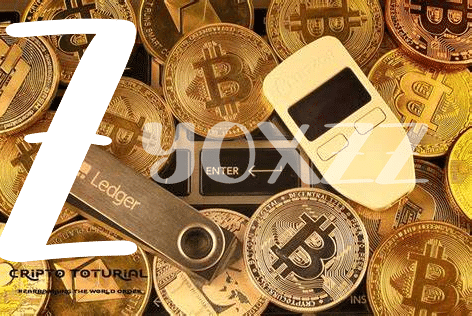What Are Hardware Wallets? 🤖

Imagine a tiny, portable vault that you can carry in your pocket, safeguarding your digital treasures like a loyal guard. This isn’t a scene from a sci-fi movie but a simple way to describe hardware wallets. They are physical devices, akin to fancy USB drives, designed to keep your cryptocurrency safe and sound. Unlike keeping your money in a traditional wallet, where physical theft is a threat, hardware wallets protect against digital pickpockets—hackers eager to swipe your digital coins without a trace. These gadgets are built with special security measures to ensure that even if someone managed to lay their hands on your device, accessing your funds without your permission would be as challenging as solving a maze blindfolded. Here’s a quick look at how they compare to another form of cryptocurrency storage:
| Feature | Hardware Wallets | Paper Wallets |
|---|---|---|
| Security | High (built-in protections) | High (no electronic vulnerability) |
| Physical Durability | Depends on device quality | Subject to physical damage |
| Convenience | Plug and play; easy transactions | Less convenient for frequent transactions |
| Risk of Loss/Theft | Can be mitigated with backup/recovery options | Total loss if physically lost, no backup |
By opting for a hardware wallet, you’re essentially choosing a mini, moveable fortress for your digital assets. It’s an option that marries sophistication with simplicity, ensuring that your cryptocurrency is both secure and readily accessible when you need it.
Understanding Paper Wallets: the Basics 📄
Let’s dive into the world of paper wallets. Picture this: you’ve got a piece of paper where you jot down some really important codes. These codes aren’t just any scribbles; they’re the keys to your digital treasure chest. In the realm of cryptocurrencies, having these keys means you’ve got access to your digital money without needing the internet or any fancy gadgets. It’s like having a secret map that leads right to your buried treasure! The beauty of paper wallets lies in their simplicity. You write down your secret codes, keep this paper safe, and voila, you’re the keeper of your own digital gold. It’s a bit old school, but sometimes, simpler is better. However, it’s not all smooth sailing. Keeping this piece of paper safe is crucial. It’s the only way to get your hands on your digital coins. Lose it or let it get damaged, and your treasure might as well be lost at sea.
For a deeper dive into the digital world’s security issues, including how to safeguard your treasures, you might want to explore this interesting read I stumbled upon. It’s packed with insights, especially for those who are sailing into uncharted waters. Learn more at https://wikicrypto.news/exploring-nft-vulnerabilities-how-secure-is-your-digital-asset. This could be your compass in navigating through the stormy seas of digital assets, ensuring your treasures remain safe.
Comparing Security: Locks and Vaults 🔐

Imagine you’re protecting a treasure. On one side, you have a high-tech safe, aka the hardware wallet, which is tough to crack and keeps your treasure secure with advanced technology. On the other, a map leading to the treasure, or the paper wallet, that’s simple but requires careful handling to avoid it falling into the wrong hands. While the hardware wallet shields your assets behind layers of digital locks, the paper wallet’s security hinges on physical safety and secret-keeping. Yet, both strive to keep your treasure safe from pirates in their own unique ways. The question of which vault is stronger against attacks depends on how you handle the keys and who you’re defending your treasure from. 🚪🔒 Remember, the best vault might be a blend of both, balancing tech-savvy tools and good old secrecy.
Accessibility and Convenience: Keys in Hand 🗝️

When it comes to managing your digital money, think of it like having a swiss army knife for camping – you want it to be handy and do a lot without weighing you down. For those opting for a hardware wallet, it’s like having a secure keychain that allows you to pay for your morning coffee or check your balance with gadgets that fit in your pocket. On the flip side, paper wallets are more like the old-fashioned suitcase under your bed. They’re safe because they’re not connected to the internet, but if you decide to spend your digital cash, it involves a bit more hoop-jumping. You’d need to transfer your info into an online wallet first, making it a tad less convenient than its high-tech counterpart.
The ease of use in both cases can significantly influence your daily life. Imagine needing to move quickly or wanting to make a spontaneous purchase; the hardware wallet shines by giving you instant access to your funds with minimal fuss. However, amid rising bitcoin and corporate adoption security concerns, some may prefer the peace of mind that comes with the extra steps required by a paper wallet. Ultimately, whether you value the sleekness of modern tech or the solid assurance of a physical backup, your choice depends on how you balance convenience against the need for security in your financial dealings.
The Risk Factor: What Could Go Wrong? 🚨
Imagine tucking away your savings into what you think is a secure vault, only to realize the lock wasn’t as strong as you thought. In the world of digital money, hardware wallets, those neat little devices designed to keep your digital coins safe, can themselves fall prey to mischievous minds if not updated regularly or bought from reputable sources. On the flip side, paper wallets, a more old-school method, scribbling your precious access keys on a piece of paper, seem straightforward and hacker-proof. However, they’re not without their pitfalls—misplace that slip of paper, and your digital treasure trove could be gone forever. Ink fading, water damage, or simply forgetting where you stashed it could turn your assets into ghosts. What makes choosing the right safeguard method tricky is balancing convenience with security. 🚨⚖️🔍
| Risk Factor | Hardware Wallets | Paper Wallets |
|---|---|---|
| Theft | Vulnerable to cyber attacks if not updated | Physical theft if not securely stored |
| Damage | Can be physically damaged, making recovery difficult | Prone to damage from fire, water, and other elements |
| Loss | Recovery is possible with backup phrases | Loss is irreversible without copies |
Making the Choice: What’s Best for You? 💡

Deciding between hardware and paper wallets is like choosing between a high-tech security system and a secret safe hidden in your home. Both have their unique sparkle ✨ and shadows 🌑. Hardware wallets, akin to a digital fortress, offer robust protection against online threats, making them a safe haven for your digital currencies. They are the go-to for anyone looking to actively engage in the digital currency space while minimizing risks. On the flip side, paper wallets are the epitome of simplicity and offline security, serving as a nearly impenetrable barrier against cyber attacks. This method is akin to keeping your treasures locked away in a private vault, where the only way in is through the physical key you hold. However, it’s crucial to navigate these waters with an awareness of bitcoin and the dark web security concerns, as the digital currency realm is not devoid of risks. The choice boils down to your lifestyle, risk appetite, and interaction with the digital currency world. Are you in for the convenience and added security layers of hardware wallets, or do the simplicity and impenetrability of paper wallets appeal more to you? Reflect on what feels right, trust your gut, and embark on your digital currency journey with confidence.
